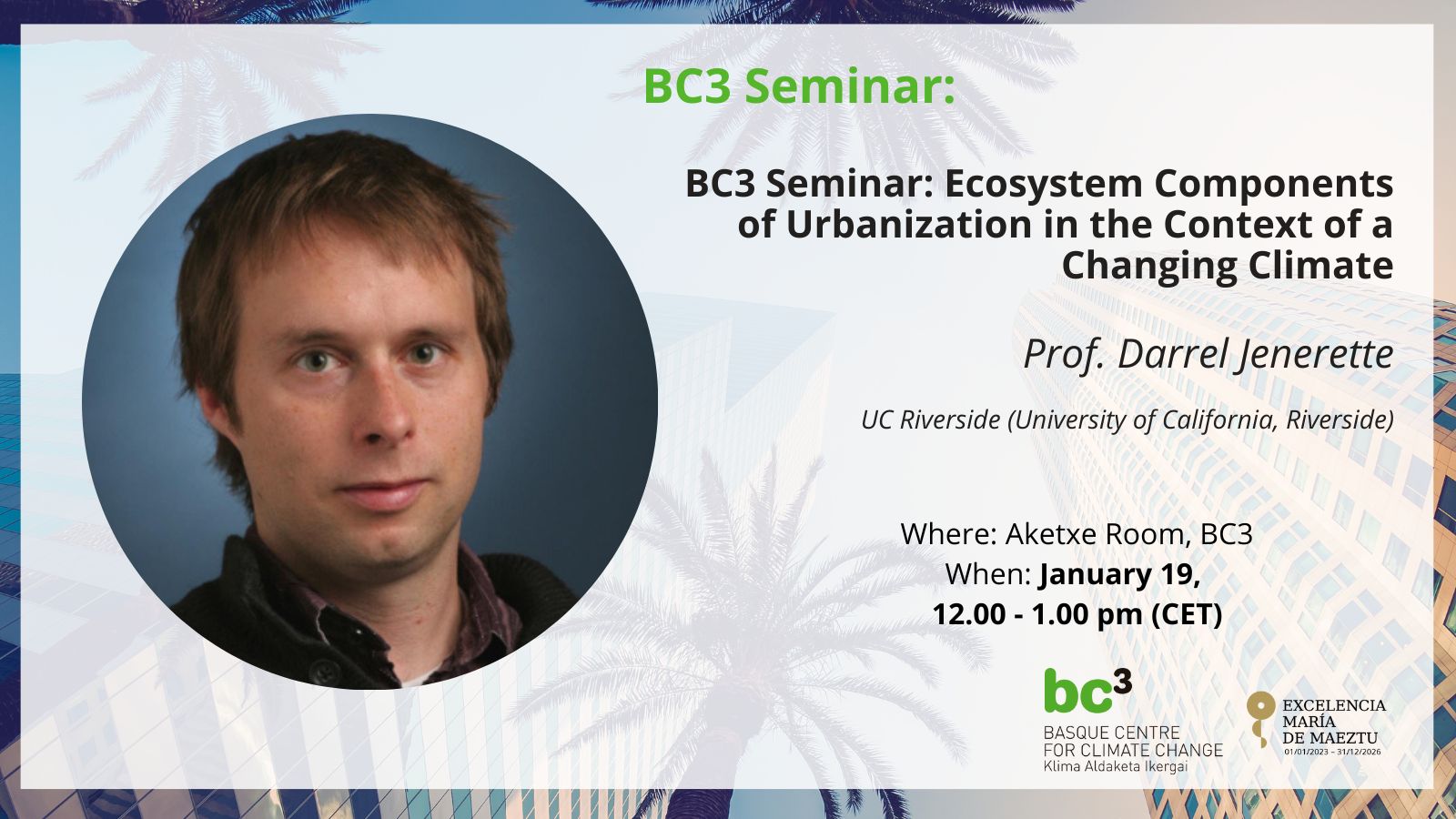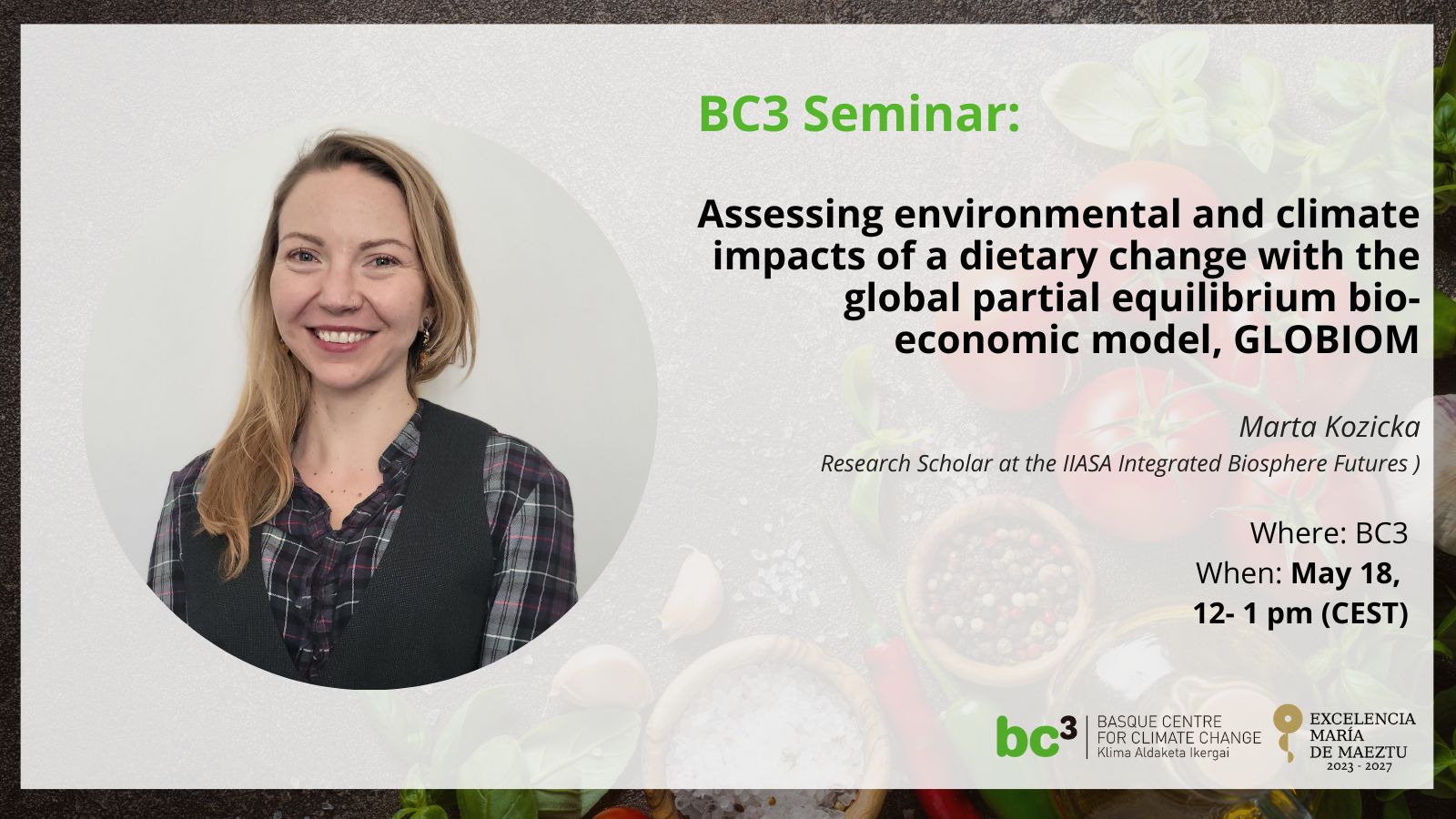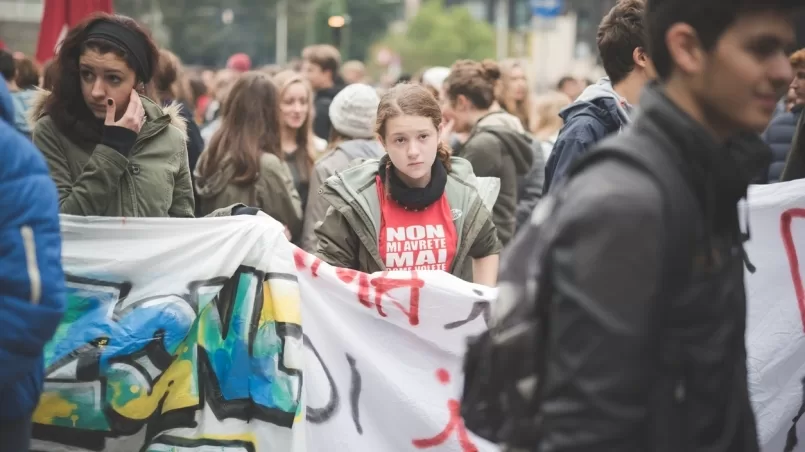Seminarios
Ecosystem Components of Urbanization in the Context of a Changing Climate
BC3-Basque Centre for Climate Change Sede Building 1, 1st floor, Scientific Park of the University of the Basque Country, Leioa, Bizkaia, SpainUrbanization is a major driver of global ecological changes. At the same time, ecological dynamics have a substantial impact on urban residents, which includes more than half of the worldwide population. To explore the reciprocal interactions between urbanization and ecological processes I use the Los Angeles, USA megacity region as a case study.
Tree species mixing as a strategy for adaptation to climate change
BC3-Basque Centre for Climate Change Sede Building 1, 1st floor, Scientific Park of the University of the Basque Country, Leioa, Bizkaia, SpainForest ecosystems are more and more threaten by the increasing biotic and abiotic disturbances triggered by global change. Adapting forest systems to climate change while maintaining their mitigation capacity is the main challenge to achieve a climate smart forestry.
The Solution is Social: How and why to work with the human dimension in climate change research
BC3-Basque Centre for Climate Change Sede Building 1, 1st floor, Scientific Park of the University of the Basque Country, Leioa, Bizkaia, SpainBC3 Seminars "The Solution is Social: How and why to work with the human dimension in climate change research " Dr. Julia Leventon Head of the […]
Epidemiology and Urban Health research in our Unequal and Complex Cities
BC3-Basque Centre for Climate Change Sede Building 1, 1st floor, Scientific Park of the University of the Basque Country, Leioa, Bizkaia, SpainUrban health research has greatly improved in quality, quantity, and depth over the past 20 years. Just in the last decade, we have seen a large increase in publications, scientific journals, conferences, books, and courses. This growth highlights the fact that there is a large and growing amount of knowledge that could be translated into policies to improve population health and reduce health inequities in cities worldwide.
Transformation Labs, socio-ecological innovation and imagination
BC3-Basque Centre for Climate Change Sede Building 1, 1st floor, Scientific Park of the University of the Basque Country, Leioa, Bizkaia, SpainTransformation Laboratories or T-Labs for short are participatory and innovation processes to foster social-ecological changes towards more sustainable pathways. The idea of transformations is a response to incremental adaptation strategies that aim at maintaining business-as-usual. In my presentation I will talk about my experience as part of the T-Lab project in the urban wetland of Xochimilco, in México city.
Assessing environmental and climate impacts of a dietary change with the global partial equilibrium bio-economic model, GLOBIOM
BC3-Basque Centre for Climate Change Sede Building 1, 1st floor, Scientific Park of the University of the Basque Country, Leioa, Bizkaia, SpainGLobal BIOsphere Management model (GLOBIOM, Havlík et al. 2014), developed at IIASA is a global economic land use model covering the sectors of agriculture, forestry and bioenergy. GLOBIOM can be used to explore various trade-offs and synergies around land use, ecosystem services and socio-economic objectives.
Mesa redonda de BC3 sobre IA, ética y democracia
El proyecto ARIES de BC3 organiza una mesa redonda presencial el 25 de septiembre en Bilbao bajo el título “Inteligencia artificial, ética y democracia: retos y oportunidades” con la participación del Instituto de Gobernanza Democrática (Globernance), el Basque Artificial Intelligence Centre (BAIC) e Ikerbasque.
Co-producing adaptation knowledge for improved decision support
BC3-Basque Centre for Climate Change Sede Building 1, 1st floor, Scientific Park of the University of the Basque Country, Leioa, Bizkaia, SpainHow to best connect adaptation science and practice? In January the Stockholm Environment Institute (SEI) will host a session on insights and lessons learned related to good practice co-produced climate services for improved adaptation planning and decision-making.
COP28: resultados y claves a futuro
Participa en el seminario "COP28: resultados y claves a futuro" el día 1 de febrero en el Palacio Miramar de San Sebastian donde se analizarán los principales resultados de la cumbre de Dubái, así como las claves que podemos esperar a futuro de la mano de María José Sanz, directora científica del centro de investigación BC3, Basque Centre for Climate Change.
The Environment, the silent partner of the one health triad
BC3-Basque Centre for Climate Change Sede Building 1, 1st floor, Scientific Park of the University of the Basque Country, Leioa, Bizkaia, SpainThe One Health approach is a global public health strategy that emphasises collaboration and communication across human, animal, and environmental health domains to achieve optimal well-being. Originating in response to zoonotic outbreaks like SARS and Ebola (and later COVID), it is integral to various global commitments such as the Sustainable Development Goals and the Paris Agreement.









